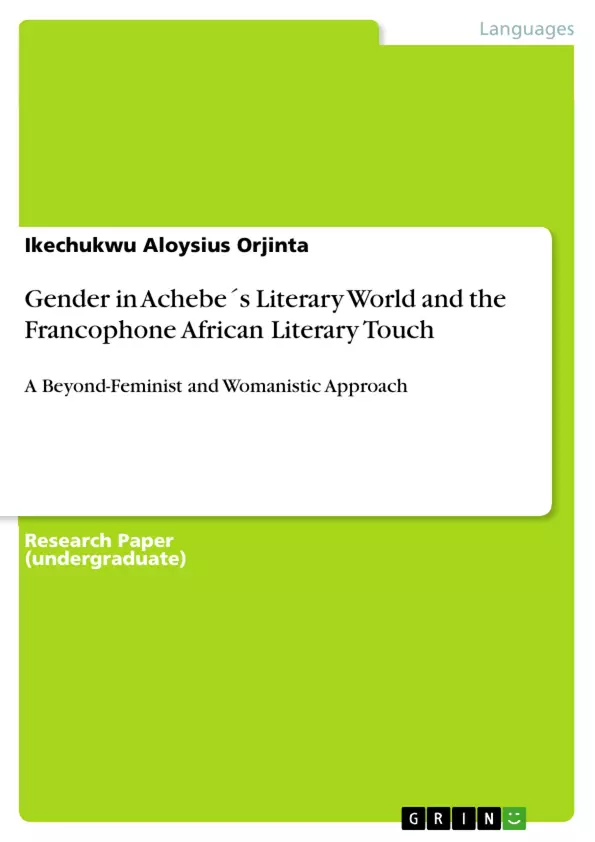Feminism takes different dimensions: the men haters who are the extremists
and the moderates who seek for dialogue between the genders for mutual
benefits. Among the extremists are Julia Kristera. She calls for a non-sexist
language. Jucie lrigaray’s thesis was her medium of launching attacks
against freud’s light/darkness imagery. This work titled speculum de l’autre
femme (speculum of the other woman) brought her expulsion from Lacan’s
Ecole Freudienne at Vincennes. Helene Cixous took men on the sexist binary
opposition. [...]
Inhaltsverzeichnis (Table of Contents)
- Introduction
- Background to Chinua Achebe's Literary World
- Genesis of African Literature
Zielsetzung und Themenschwerpunkte (Objectives and Key Themes)
This work aims to explore the portrayal of gender in Chinua Achebe's literary world and its connection to the Francophone African literary tradition. The analysis goes beyond traditional feminist perspectives to offer a nuanced understanding of gender roles and dynamics within these literary contexts.
- Gender Roles and Representations in African Literature
- The Influence of Francophone African Writers on Achebe's Work
- The Intersection of Gender, Culture, and History in African Literature
- The Impact of Colonialism and Postcolonialism on Gender Dynamics
- The Role of Women in African Society and Literature
Zusammenfassung der Kapitel (Chapter Summaries)
- Introduction: The chapter introduces the concept of feminism and its different dimensions, discussing both extremist and moderate perspectives. It then highlights the key themes of the work, including gender complementarity and the role of men and women in society.
- Background to Chinua Achebe's Literary World: This chapter delves into the genesis of African literature, emphasizing the historical context and the importance of portraying accurate and authentic representations of Africa. The chapter also examines how previous literary portrayals of Africa often perpetuated stereotypes and prejudices, particularly against African women.
- Genesis of African Literature: This chapter explores the historical context of African literature, highlighting the need to address distortions and prejudices in earlier representations of Africa. It also examines the role of African writers in challenging these negative portrayals and reclaiming their own narratives.
Schlüsselwörter (Keywords)
The key terms and concepts explored in this work include gender representation, African literature, Francophone African literature, Chinua Achebe, colonialism, postcolonialism, feminism, womanism, gender complementarity, cultural nationalism, and the role of women in African society.
Frequently Asked Questions
What are the main dimensions of feminism discussed in this work?
The work distinguishes between extremist perspectives, often characterized as "men haters," and moderate perspectives that seek dialogue between genders for mutual benefits.
How does Chinua Achebe’s literary world relate to Francophone African literature?
The analysis explores the influence of Francophone African writers on Achebe's work and how both traditions address gender roles, culture, and history within the African context.
What is the significance of "gender complementarity" in this study?
Gender complementarity is a key theme used to understand the balanced roles of men and women in African society, moving beyond traditional Western feminist binary oppositions.
How did colonialism impact gender dynamics in African literature?
The work examines how colonialism and postcolonialism shifted gender roles and how literature reflects the historical distortions and prejudices created during these periods.
Who are some of the feminist theorists mentioned in the abstract?
The abstract mentions Julia Kristeva, who calls for non-sexist language; Luce Irigaray, known for her critique of Freud; and Hélène Cixous, who challenged sexist binary oppositions.
- Arbeit zitieren
- Dr. Dr. Ikechukwu Aloysius Orjinta (Autor:in), 2011, Gender in Achebe´s Literary World and the Francophone African Literary Touch, München, GRIN Verlag, https://www.grin.com/document/177357



